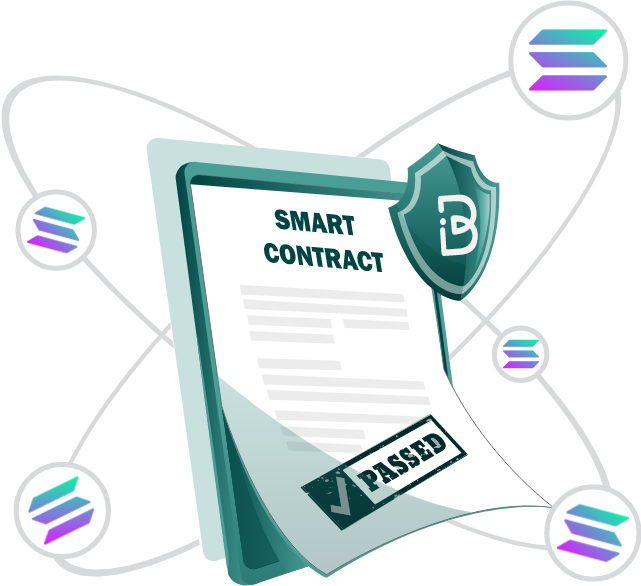What are Solana Smart Contracts?
Solana is a fast-growing platform, consistently ranking in the top three blockchain list! It supports the development of fast and reliable applications. However, security is the biggest challenge for the developers writing Solana smart contracts. The primary Solana programming language is Rust, but C, C++, and Python are supported.
Getting your Solana smart contract audited has many benefits, including preventing financial losses and ensuring the contract meets all the requirements. Using Rust as its primary development language, Solana makes room for various attack vectors. ImmuneBytes's auditors are proficient enough to audit Rust contracts and discover vulnerabilities.
Why Is It Important?
The security of a Solana project is paramount. As a popular network, it is always under watch for new projects with weaknesses. Here are a few reasons you should consider getting your Solana smart contracts audited:

No More Loss of Funds
Vulnerabilities in Solana smart contracts can result in massive losses of funds, both yours and your clients. With ImmuneBytes audits, you can rest assured that your assets are safe on the blockchain.

Code Optimization
Gas plays an important role in Solana smart contracts. It becomes crucial to optimize the usage of gas in your source code. We not only reveal bugs but also offer recommendations for improving gas usage.

Build Trust
The stamp of an audit on your smart contracts attracts potential investors and clients. Smart contracts audited by ImmuneBytes have a lesser chance of getting exploited.
In 2022, Ronin Network Lost $625 Million in an Exploit and Still Survived.
Can You Handle Anything Remotely Close to This?
Why Should You Undergo An Solana Smart Contract Audit?
An audit ensures that your smart contract code is free from all such vulnerabilities and is immune to exploits. The security team at ImmuneBytes makes your contracts go through a thorough examination to uncover any bugs in your code!
$6B
Lost in Crypto Hacks So Far
$3.8B
Lost in 2022 Alone
82%
Hacks Targeted Defi Protocols
3x Damage
Lost funds + Lost trust + Lost market value
What Do We Offer?
ImmuneBytes offers not just audits but a foolproof security layer for your Solana projects. Take a look at the features you get once you choose us as your security partners:


Extensive Audit Report
Our audit reports are comprehensive and document every measure taken during the audit process. We classify the vulnerabilities according to their severity levels and offer remediations and code optimizations.


Check For 100+ Vulnerabilities
We analyze a smart contract for over a hundred vulnerabilities. These include bugs that have been exploited and others that could be exploited in the future.


Smart Contract Fuzzing
We fuzz-test your smart contracts as an additional measure. Fuzzing a smart contract ensures that it will not behave unexpectedly against any given input, minimizing the risk of hacks.


Post Refactor Reaudits
Not just once, we audit your code twice! Once your developers review our audit report and make the recommended fixes, we again analyze your contract and prepare the final audit report.


Security Test Cases
Our auditors use frameworks like Foundry, HardHat and Truffle to write unit test cases other than the developers provided. We ensure to traverse every possible branch of execution in the source code.


Quick Turnaround Time
A dedicated team of auditors is assigned to your project, who usually take 3-10 days to complete an audit, depending on the code size. We are result-oriented and understand the gravity of deadlines.
Migrate Your Smart Contract From Testnet To Mainnet,
But Without Vulnerabilities.
Recent Blogs
Everything you need to know to get familiar with Web3! News, Blogs, Announcements and more.
FAQs
The world of Solana is enormous. And so are the questions associated with them. Here, we list the top 5 most frequently asked questions on the Solana Ecosystem.
